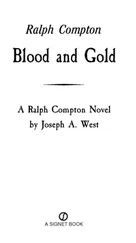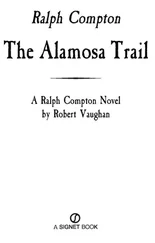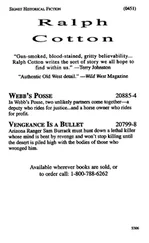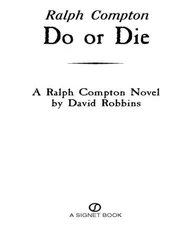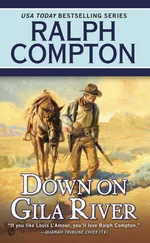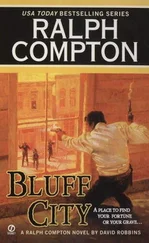Ralph Compton - West of the Law
Здесь есть возможность читать онлайн «Ralph Compton - West of the Law» весь текст электронной книги совершенно бесплатно (целиком полную версию без сокращений). В некоторых случаях можно слушать аудио, скачать через торрент в формате fb2 и присутствует краткое содержание. Год выпуска: 2008, ISBN: 2008, Издательство: Thorndike Press, Жанр: Старинная литература, на английском языке. Описание произведения, (предисловие) а так же отзывы посетителей доступны на портале библиотеки ЛибКат.
- Название:West of the Law
- Автор:
- Издательство:Thorndike Press
- Жанр:
- Год:2008
- ISBN:9781410409225
- Рейтинг книги:4 / 5. Голосов: 1
-
Избранное:Добавить в избранное
- Отзывы:
-
Ваша оценка:
- 80
- 1
- 2
- 3
- 4
- 5
West of the Law: краткое содержание, описание и аннотация
Предлагаем к чтению аннотацию, описание, краткое содержание или предисловие (зависит от того, что написал сам автор книги «West of the Law»). Если вы не нашли необходимую информацию о книге — напишите в комментариях, мы постараемся отыскать её.
West of the Law — читать онлайн бесплатно полную книгу (весь текст) целиком
Ниже представлен текст книги, разбитый по страницам. Система сохранения места последней прочитанной страницы, позволяет с удобством читать онлайн бесплатно книгу «West of the Law», без необходимости каждый раз заново искать на чём Вы остановились. Поставьте закладку, и сможете в любой момент перейти на страницу, на которой закончили чтение.
Интервал:
Закладка:
A sense of defeat weighing on him, McBride made his way back behind the stores, but he stopped at a hand pump at the rear of the restaurant, his face puzzled. The pump stood in the light of a window and around it the ground was muddy. The thing that had caught McBride’s eye was a perfect footprint in the mud. He kneeled and looked closer. The only person who would pump water for the restaurant was the waitress, but she would surely have left more than one footprint. In any case this was too wide to be a woman’s print. The track was very recent and it was shallow. McBride guessed it had been left by a smallish man who could not have weighed more than 140 pounds. What intrigued McBride was that it was a shoe print, probably made by a shoe with a leather sole and heel. As far as he was aware, all of Gamble Trask’s men wore boots. Hack Burns certainly did. So did Stryker Allison and the miners who helped Trask bring in the Chinese girls.
McBride was convinced the man who’d tried to kill him at the shack and then fled had left this print. He was equally sure it wasn’t one of Trask’s men. Then who?
Unbidden, a dark memory wormed its way into his mind, of a man back in New York called Gypsy Jim O’Hara. He was nicknamed Gypsy not because he was a Romany but for his swarthy skin and black eyes and hair.
O’Hara was a contract killer, an ice-cold assassin without conscience who was suspected of at least two dozen murders. Inspector Byrnes had many times tried to bring O’Hara to justice, but the man always had a cast-iron alibi and walked free. He also enjoyed the protection of gangsters like Sean Donovan who appreciated his deadly skills and provided him with the best lawyers money could buy.
Jim O’Hara was a small, compact man with the flat, soulless eyes of a basilisk. Extremely vain, he always dressed in the height of fashion and a shoe-shine was part of his morning ritual. He was good with a revolver but would use a shotgun or knife as the occasion demanded. O’Hara was a bad enemy, relentless in pursuit, merciless at the kill, a man to be reckoned with.
McBride stood and looked around him. Away from the glare of the streetlamps the stars were visible, the sky a spangled roof over the world that gradually melted in the distance and became one with the violet darkness of the plain. The coyotes were talking to the night birds and the prairie wind was asleep. Nothing moved among the brooding shadows but hidden things that skittered and screeched and hunted their own kind.
The air smelled of dust and heat as McBride stood, head bent in thought.
Gypsy Jim here in High Hopes? That was impossible. The man was a sewer rat who would never leave the suffocating brick canyons and swarming, filthy alleys of the city. Yet Byrnes had warned him that Donovan’s reach was long. Was O’Hara here—hunting him?
It was not so improbable as it sounded. Many crooked New York cops were on Sean Donovan’s payroll. Could it be that McBride’s message to Byrnes had been intercepted, the envelope steamed open and the letter read? Pay O’Hara enough money and he’d track a man all the way into hell.
McBride shook his head. He was thinking like an old lady who hears a rustle in every bush. His dread of Gypsy Jim was based on a single shoe print that could have been left by anybody, a gambler maybe, or a member of the town’s broad-clothed citizenry.
He breathed deep, fighting his own overwrought imagination. But the thought lingered, nagging at him like a bad toothache. He had a copper’s instinct for danger and now it was telling him to be wary, that the danger he sensed was very close and getting closer.
He would go on the assumption that Gypsy Jim was in High Hopes, at least until he learned differently. McBride took no joy in that conclusion. It brought him only a great deal of worry.
The shack was still a blazing inferno as McBride walked along the street to the hotel. He smiled when he saw that Trask had organized a bucket brigade. The man was running around in a panic, barking orders to miners who were throwing water on the back wall and roof of the saloon. Fire was always a hazard in a wooden town, and sparks from the burning shack could easily set the Golden Garter alight.
Trask had good cause to be panicked and that pleased McBride mightily. To his relief he saw Shannon standing outside on the boardwalk, a shawl around her shoulders. She saw him, smiled and waved, then went back inside.
McBride lit the lamp in his room and grieved mightily for his lost coat. It had cost him ten dollars at Aaron Goldberg’s Clothing Emporium for Gents back in New York and he doubted if he’d find another quite so fine.
He stepped to the window and looked outside. The fire had died down and the bucket brigade had disbanded. There was no sign of Trask.
He heard a soft knock at his door and smiled. Shannon had come to pay him a visit. He stepped to the door and opened it wide, his smile quickly fading as he saw the small, compact man in the doorway—a man who held a gun aimed right at his belly.
Chapter 13
‘‘You call yourself John Smith?’’ the man asked.
McBride nodded. ‘‘I go by that name.’’
The man motioned with the gun. ‘‘Inside.’’ McBride hesitated. ‘‘Now!’’
McBride backed into the room and his visitor followed, shutting the door behind him with his foot. He was wearing boots.
‘‘Shuck the iron with your left hand and lay it on the bed,’’ the man said.
McBride did as he was told. ‘‘I didn’t catch your name,’’ he said.
‘‘I didn’t give it.’’ A moment’s pause, then: ‘‘Name’s Luke Prescott, out of Pueblo and other places.’’
‘‘Your brother—’’
‘‘Was Rusty Prescott. You killed him.’’
‘‘He tried to kill me.’’
‘‘I know.’’ To McBride’s surprise Prescott holstered his gun. ‘‘Move away from the bed,’’ he said. ‘‘I’m not what you’d call a trusting man.’’
McBride stepped close to the window. ‘‘Now you want revenge, is that it?’’
Prescott nodded. ‘‘That’s why I’m here.’’
The man saw McBride’s eyes angle to the gun on the bed and he smiled. ‘‘Don’t even think about it. I’d put three bullets into your belly before you even got halfway there.’’
‘‘I’d still get a couple into you,’’ McBride said.
‘‘Maybe you would at that.’’ Prescott shrugged. ‘‘Then again, maybe you wouldn’t.’’
The man was dressed in dusty range clothes, but his boots, hat and coat were all top quality. He hadn’t bought those duds on a puncher’s wages, McBride decided, experiencing a momentary pang of regret for his own coat.
‘‘I heard that somebody paid my brother to kill you and another man. Is that the way of it?’’ Prescott asked, his eyes searching McBride’s face.
‘‘That’s the way of it. He killed an old newspaperman named Theo Leggett. He missed me. Later I found five double eagles in your brother’s pocket. That works out at fifty dollars a man, cheap enough for a human life.’’
‘‘Rusty always figured on making money the easy way. He wasn’t much on hard work, leastways not punching cows on a half-broke pony eighteen hours a day for thirty dollars a month.’’
‘‘Too bad,’’ McBride said. ‘‘But he should have stayed on the ranch.’’
‘‘I said them very words when I buried him. He should have stayed on the ranch.’’ Prescott’s gaze again explored McBride’s face. ‘‘You heard my name before?’’
‘‘Yes. I was told you’re pretty good with that gun on your hip. Of course, that’s only what people say. I don’t know the truth of it.’’
Prescott moved. Suddenly, in a motion too fast to see, the Colt was in his hand. He did a border shift, twirled the gun, then sent it spinning back to his right hand. The Colt was still revolving when he slammed it into the holster.
Читать дальшеИнтервал:
Закладка:
Похожие книги на «West of the Law»
Представляем Вашему вниманию похожие книги на «West of the Law» списком для выбора. Мы отобрали схожую по названию и смыслу литературу в надежде предоставить читателям больше вариантов отыскать новые, интересные, ещё непрочитанные произведения.
Обсуждение, отзывы о книге «West of the Law» и просто собственные мнения читателей. Оставьте ваши комментарии, напишите, что Вы думаете о произведении, его смысле или главных героях. Укажите что конкретно понравилось, а что нет, и почему Вы так считаете.

